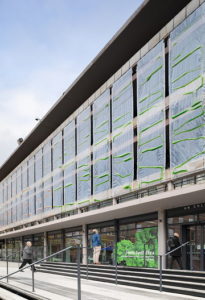
London-based architectural and design studio ecoLogicStudio recently revealed a large-scale installation it calls “photo.synth.etica” during Dublin’s Climate Innovation Summit 2018. Created in collaboration with climate-KIC, prominent EU climate innovation initiative, the urban curtain aims to accelerate solutions to global climate change by capturing CO2 from the atmosphere and storing it in real-time: approximately one kilo of CO2 per day, equivalent to that of 20 large trees.
Each module functions as a photo-bioreactor, which, essentially, is a digitally designed and custom-made bioplastic container that uses daylight to feed the living micro-algal cultures and releases luminescent shades at night.
Here’s how the curtain works: As unfiltered urban air is introduced at the bottom of the façade, it starts traveling naturally via air bubbles that rise through the bioplastic. When it comes in contact with hungry microbes, they capture and store the CO2 molecules and air pollutants in algae and grow it into biomass. This can be harvested and employed in the production of bioplastic raw material that constitutes the main building material of the photo-bioreactors. The process ends when freshly photosynthesized oxygen is released at the top of the façade and into the urban microclimate.
ecoLogicStudio is an architectural and urban design studio co-founded in London by Claudia Pasquero and Marco Poletto. In the past few years the studio has built up an international reputation for its work on ‘systemic’ design, which involves a combi-nation and integration of systemic thinking, bio and socio-logic research, parametric design and prototyping.
Completed projects include a public library, private villas, large facades and eco-roofs. The studio has developed prototypes and installations for important Architectural Biennales, including Venice in 2008 and 2010, Seville, Istanbul and Milan Fuorisalone. The studio runs international workshops and cultural activities and is involved in academic research.
 TEXTILES.ORG
TEXTILES.ORG


